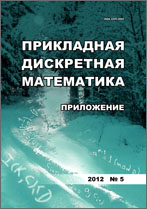|
Mathematical Foundations of Computer Security, Informatics and Programming
Polynomial grammars generating an infinite set of languages
O. I. Egorushkin, I. V. Kolbasina, K. V. Safonov
M. F. Reshetnev Siberian State University of Science and Technologies
Abstract:
We continue the study of formal grammars, by which we mean systems of polynomial equations with respect to noncommutative variables, which are solved in the form of formal power series expressing nonterminal alphabet symbols through terminal alphabet symbols. The first component of the solution is a formal language. The definition of a grammar having infinitely many solutions (generating an infinite number of languages) is considered. Such grammars can arise in a situation, where the Jacobian of the commutative image of the grammar is identically equal to zero. It is shown that in the case of the Jacobian, which is identically equal to zero, it is more difficult to describe the set of grammatical solutions than for similar polynomial systems with real or complex variables, since all possible situations can be realized: such a grammar may have infinitely many solutions, any finite number of solutions, or no solutions at all.
Keywords:
polynomial grammars, noncommutative variables, formal power series, commutative image, Jacobian.
Citation:
O. I. Egorushkin, I. V. Kolbasina, K. V. Safonov, “Polynomial grammars generating an infinite set of languages”, Prikl. Diskr. Mat. Suppl., 2022, no. 15, 78–80
Linking options:
https://www.mathnet.ru/eng/pdma585 https://www.mathnet.ru/eng/pdma/y2022/i15/p78
|

| Statistics & downloads: |
| Abstract page: | 84 | | Full-text PDF : | 19 | | References: | 16 |
|




 Contact us:
Contact us: Terms of Use
Terms of Use
 Registration to the website
Registration to the website Logotypes
Logotypes








 Citation in format
Citation in format 